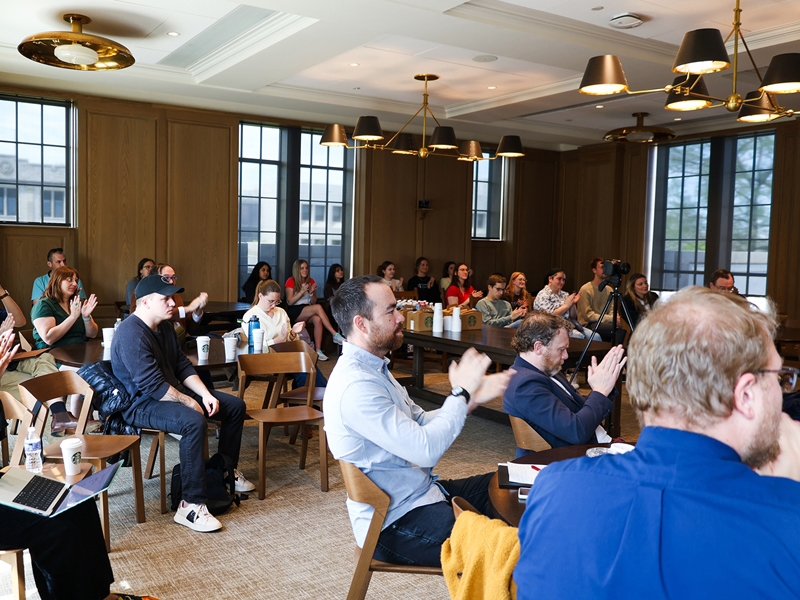'From Surveillance to Visibility' Symposium Held April 12
On April 12, the World Languages and Digital Humanities Studio and the Eta Sigma Phi Honors Society of the Classical Studies Program co-organized a symposium titled "From Surveillance to Visibility: A Symposium on the Global History, Culture, and Technology of Watching and Being Watched" at the Cordia Harrington Center for Excellence.
Co-hosted by Rhodora Vennarucci of the Classical Studies Program and Curtis Maughan of the World Languages and Digital Humanities Studio, the symposium featured visiting speakers from the University of Oklahoma, Washington University and the U of A, including Lisa Corrigan, professor of communication, and Carter Buckner, a doctoral student in computer science and computer engineering.
Visiting guest speakers Joey Williams and Sue Alcock, both of the University of Oklahoma, and Sarah Koellner of Washington University led the first three sessions, respectively. In his talk titled "All Along the Watchtower: Surveillance, Invisibility, and Indigenous Resistance in a Roman Colonial Landscape," Williams examined the history of how watchtowers were used for surveillance in the ancient Roman world, the significance of specific architectural structures and the importance of countersurveillance as well. Furthermore, Williams discussed how the indigenous peoples of Roman-colonized nations fought back against Roman imperialism, undermining Roman battle tactics with guerilla warfare.
Following Williams, Sue Alcock presented "Watching Me, Watching You: Greek Helots and Their Masters," which discussed how surveillance was used, impacted and ultimately governed the fraught relationship between Spartans and the "helots," the conquered Messenian people. The helots were subjected to Sparta in a status deemed "between free men and slaves."
Koellner held a multimedia presentation titled "Spaces of Surveillance: From Docile Bodies to Images and Voices of Resistance in Contemporary German Film and Literature." Koellner's presentation focused on the concept of Foucault's Panopticism and the manifestation of this imagery in European refugee camps. Koellner focused specifically on the documentary Central Airport THF by Karim Aïnouz and the literary work by Sam Zamrik to make an argument for recontextualization of Germany's management of refugees within its colonial and totalitarian past.

“From Surveillance to Visibility” Symposium guest lecturers. From top left: Joey Williams of the University of Oklahoma; Sue Alcock of the University of Oklahoma; Sarah Koellner of Washington University; Carter Buckner, a Ph.D. student at the U of A; and Lisa Corrigan, professor of communication at the U of A.
Following Koellner, Carter Buckner, a U of A Ph.D. student in computer science and computer engineering, held a talk on "AI Surveillance and Mitigation Techniques." Buckner gave an overview of different forms of AI and how individuals can counter some of the more invasive AI by increasing their personal privacy and discussed case studies in which facial recognition AI was used in criminal justice cases.
Finally, U of A professor Lisa Corrigan closed out the proceedings with a presentation on "The Tension Archives: Paranoid Hang-ups, Racial Repression, and Betrayal in the Black Panther Party." Corrigan emphasized how the FBI's use of surveillance and infiltration impacted the Black Panther Party, ultimately causing rifts among party leadership.
With over 80 attendees, the symposium generated interesting discussions, as each speaker's talk was followed by productive Q&As. German and classical studies students were in high attendance throughout the day, as well as students from a broader interdepartmental range, including computer science, communications and Chinese.
The event was made possible by generous support from the classical studies honors society Eta Sigma Phi; the Classical Studies Program; The Arkansas Humanities Center; the Center for Advanced Spatial Technologies; the World Languages, Literatures and Cultures Department; and the World Languages and Digital Humanities Studio.
Topics
- Law & Justice
- Lectures, Colloquia & Symposia
- Politics & Government
- Events
- Safety & Security
- College of Engineering
- Fulbright College of Arts & Sciences
- Graduate School & International Education
- Classical Studies Program
- Department of Communication
- Department of World Languages, Literatures and Cultures
- Department of Electrical Engineering and Computer Science
Contacts
Cheyenne Roy, assistant director
World Languages and Digital Humanities Studio
479-575-4159,
ceroy@uark.edu
Headlines
Former U.S. Senator Mark Pryor to Receive Honorary Degree
The U of A will award an honorary degree to Mark Pryor, an alumnus and former U.S. senator, during its spring university commencement ceremony at 8:30 a.m. Saturday, May 11, in Bud Walton Arena.
Semiconductor Research and Fabrication Facility Celebrates Topping Out
The new facility will produce microelectronic chips made with silicon carbide, a powerful semiconductor that outperforms basic silicon in several critical ways, and allow testing of industry prototypes.
Kendyl Link Named Undergraduate Winner of Felix Christopher McKean Memorial Award
A senior involved in University Programs and Greek Life, Link's poem "Fish" will appear in Issue 9 of The Diamond Line, the U of A's undergraduate literary magazine, this spring.
Patitz Awarded NSF Grant for Research on DNA-Based Nanostructure Research
Matthew Patitz, associate professor, plans to construct nanoscale structures using DNA sequences designed to fold into elongated slats that then form complex geometries.
Interior Architecture Students Make Metropolis' Future100 List, Win Portfolio Competition
Isabel Provisor Lemery, one of three national winners, and Lacey Oxford, both students in the Department of Interior Architecture and Design, are featured among the Metropolis magazine's Future100.





